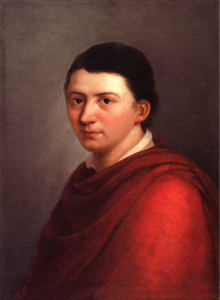Sunset
(Poet's title: Abendröte)
Set by Schubert:
D 690
[March 1823]
Part of Schlegel: Abendröte (putative cycle)
Tiefer sinket schon die Sonne,
Und es atmet alles Ruhe,
Tages Arbeit ist vollendet,
Und die Kinder scherzen munter.
Grüner glänzt die grüne Erde,
Eh die Sonne ganz versunken;
Milden Balsam hauchen leise
In die Lüfte nun die Blumen,
Der die Seele zart berühret,
Wenn die Sinne selig trunken.
Kleine Vögel, ferne Menschen,
Berge himmelan geschwungen,
Und der große Silberstrom,
Der im Tale schlank gewunden,
Alles scheint dem Dichter redend,
Denn er hat den Sinn gefunden;
Und das All ein einzig Chor,
Manches Lied aus einem Munde.
The sun is already sinking deeper,
And everything is breathing restfulness,
The day’s work has been completed,
And the children are playing about merrily.
The green earth glows greener
Before the sun has totally set;
Soft balsam is gently flowing in the breath
Of flowers carried on the breezes;
The balsam tenderly stirs the soul
As the senses drink blissfully.
Small birds, distant humans,
Mountains sweeping up to the sky,
And the great silver stream
That winds its way slenderly through the valley,
Everything appears to be speaking to the poet,
Since he has discovered the meaning;
And Everything is a single chorus,
Many a song out of only one mouth.
All translations into English that appear on this website, unless otherwise stated, are by Malcolm Wren. You are free to use them on condition that you acknowledge Malcolm Wren as the translator and schubertsong.uk as the source. Unless otherwise stated, the comments and essays that appear after the texts and translations are by Malcolm Wren and are © Copyright.
☙
Themes and images in this text:
Balm and balsam Birds Children and childhood The earth Evening and the setting sun Flowers Games and play Green Harmony Heaven, the sky High, low and deep Mountains and cliffs Mouths Near and far Poetry Rivers (Strom) Serenades and songs at evening Silver Songs (general) Soul The sun Valleys Wind
Schlegel used this (untitled) poem to act as the preface to the first part of his collection called Abendröte (Sunset). It introduces ten poems which give voice to different characters and elements as the sun sets (e.g. the mountains, the birds, the river, the butterfly). The second part of the collection (after the sun has set) begins with a similar preface and then a further ten poems present the thoughts and perceptions of the wanderer, the moon, the stars etc. Both parts of the collection end with a poem entitled ‘Der Dichter’, the poet, since it is he who claims to have been granted the ability to ‘discover the meaning’ of these diverse utterances.
At the time when he wrote the Sunset poems Friedrich von Schlegel was involved in a major project to examine and ‘find the meaning’ in a broad range of topics, from drama to linguistics, from the nature and reliability of perception to the limits of human understanding. He was making major contributions to the relationship between epistemology and aesthetics, so for him the word ‘poet’ encompassed more than the idea of a ‘writer’. The poet was the person who managed to reconcile thought and feeling, direct intuition and reflective understanding. The ‘many songs’ which came from his ‘one mouth’ were a metaphor for the complexity of the world serving as a precondition for grasping its single ultimate essence. The single chorus that sings to us of and in unity is the product of a bewildering multiplicity.
☙
Original Spelling Abendröthe Tiefer sinket schon die Sonne, Und es athmet alles Ruhe, Tages Arbeit ist vollendet, Und die Kinder scherzen munter. Grüner glänzt die grüne Erde, Eh die Sonne ganz versunken; Milden Balsam hauchen leise In die Lüfte nun die Blumen, Der die Seele zart berühret, Wenn die Sinne selig trunken. Kleine Vögel, ferne Menschen, Berge himmelan geschwungen, Und der große Silberstrom, Der im Thale schlank gewunden, Alles scheint dem Dichter redend, Denn er hat den Sinn gefunden; Und das All ein einzig Chor, Manches Lied aus einem Munde.
Confirmed by Peter Rastl with Schubert’s source, Fridrich Schlegel’s Gedichte. Erster Theil. Neueste Auflage. Wien 1816. Bey B. Ph. Bauer. pages 16-17; with Musen-Almanach für das Jahr 1802. Herausgegeben von A. W. Schlegel und L. Tieck. Tübingen, in der Cotta’schen Buchhandlung, 1802, page 133; and with Friedrich Schlegel’s sämmtliche Werke. Erster Band. Gedichte. Berlin, bei Julius Eduard Hitzig, 1809, page 12.
To see an early edition of the text, go to page 16 [24 von 190] here: http://digital.onb.ac.at/OnbViewer/viewer.faces?doc=ABO_%2BZ20491940X


